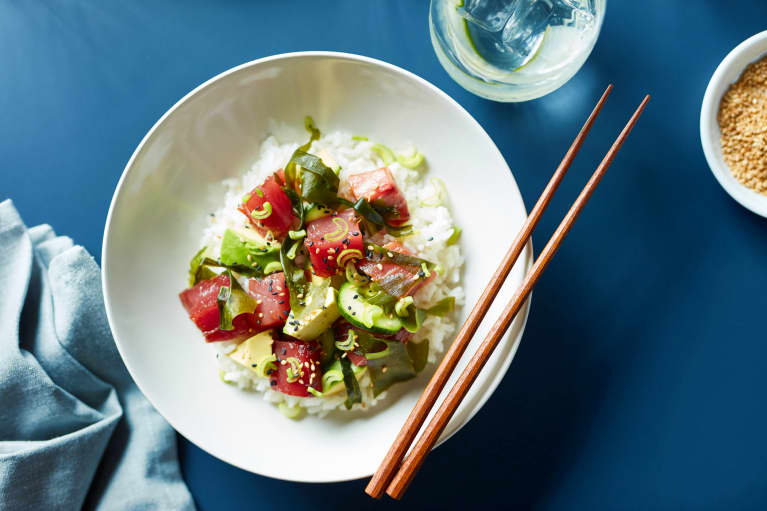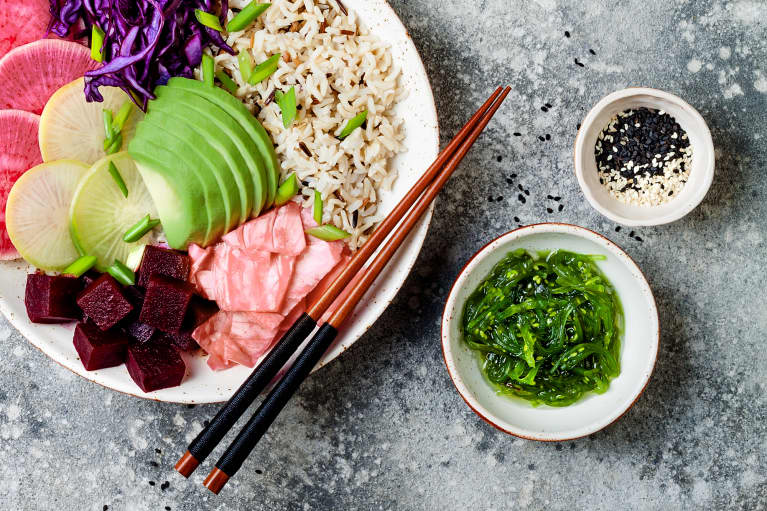Sea Vegetables: Everything You Need To Know About The Anti-Aging, Hormone-Balancing Superfood Colleen Travers By Colleen Travers ( courtecy;- mind body green )
Sea Vegetables: Everything You Need To Know About The Anti-Aging, Hormone-Balancing Superfood
September 25, 2018 — 9:00 AM
Whether you're a superfood aficionado or you've just gotten used to the taste of kale, now there's another group of superfoods floating around your local health food aisle: sea vegetables. But don't worry—if the thought of eating seaweed makes you shudder, sea vegetables actually come in a ton of different forms. Here's a breakdown of what sea vegetables are, the most common sea vegetables you should try, and why it's worth trying them in the first place.
What are sea vegetables?
Sea vegetables are exactly what they sound like: edible plants that come from the sea, as opposed to the land, says Jess Cording, M.S., RDN, CDN, a New York–based nutritionist. If you eat sushi, you're already eating sea vegetables (albeit, a very small amount of them) in the form of the seaweed that holds your spicy tuna crunch roll together. The vitamins and minerals in sea vegetables make them nutritious ingredients to add to your diet on a larger scale.
What are some common sea vegetables I can find in the store?
Both Cording and Alisa Vitti, HHC, AADP a functional nutritionist, mbg class instructor, founder of Flo Living, and creator of Cycle Synching and the MyFLO app, recommend starting with the following sea veggies and seeing which ones work for you. Note that all of these are technically seaweeds (and therefore algae since seaweed is a group of algae), but as you'll notice they go by different names, primarily depending on what species they are:
- Wakame
- Algae
- Dulse
- Kelp
- Arame
- Nori
Notice that hijiki seaweed doesn't make the list. Vitti recommends avoiding it, as it's been shown to absorb the heaviest metals from the ocean.
Why should I be eating sea vegetables?
Sea vegetables are packed with vitamins and minerals, and the nutrients they contain can be extremely beneficial for women, according to Vitti. "Sea vegetables are rich in magnesium, calcium, iron, and vitamin C, which helps the body absorb more iron," she says. This makes them especially crucial to eat during your period since your iron levels tend to dip during menstruation. It's important to keep these levels in check because when your iron gets too low, you could be at risk for developing anemia, a condition in which your body is lacking red blood cells to carry oxygen and remove carbon dioxide (iron is a big component of red blood cell composition). The iodine in sea vegetables is also an essential mineral for a healthy thyroid.
In addition to keeping your hormones on track (including stabilizing estrogen levels, Vitti says), sea vegetables are made up of fucoidan, a complex carbohydrate that has anti-inflammatory and antiviral properties and can help defend against certain diseases. One study published in the Journal of Nutrition found sea vegetables can stabilize blood sugar and reduce the risk of type 2 diabetes while another in the Journal of the Science of Food and Agriculture found that algae is helpful in lowering LDL cholesterol.
Still not convinced? Well, it turns out, sea vegetables come with another big benefit: They're great for your skin. There's a reason so many beauty companies have started developing brand-specific spins on seaweed-infused face masks and soaps. Sea veggies' high antioxidant count means that they protect against free radical damage from the environment, says Cording. Plus, thanks to their high count of iron and vitamin C that helps the body absorb iron, sea vegetables can even help give you a nice glow sans bronzer. "Iron supports healthy blood flow and oxygen throughout the body, and it's important for circulation," Cording says. "Good circulation helps skin get that rosy hue."
But how should I be eating them?
Takeout sushi is great and all, but prepping and cooking sea vegetables in your own kitchen is surprisingly easy to do. Cording loves sprinkling dulse flakes in a DIY grain bowl or over popcorn and adding seaweed to soup for some extra greens and nutrients. In general, she says the easiest way to eat sea vegetables is to make it as simple as possible. "A good first step is to incorporate it into dishes you already enjoy and eat often," she says.
And if all else fails, go for a sea vegetable supplement. "I always encourage food first, but sometimes it's easier to get the vitamins and minerals you're lacking in supplement form," Cording says. Just make sure you're buying a quality product from a trustworthy company, Cording warns (and as with all supplements, talk to your doctor before you start a new regimen). Another easy option if you can't find any sea vegetables in your local store? "Sprinkle sea vegetable powder into a smoothie or soup to make them more accessible and skip the taste," Cording says.
Can anyone eat sea vegetables?
Most likely, yes. But both Cording and Vitti emphasize that the iodine levels in sea vegetables might be an issue for someone who has an iodine sensitivity, so touch base with your doctor first—especially if you're already on medication or are thinking about going the supplement route. Once you try sea veggies, don't be afraid to experiment, Cording says. "If you don't love red seaweed, you might find a type of brown seaweed you like better. Don't give up if your first experience isn't magical."
Ready to learn more about how to unlock the power of food to heal your body, prevent disease & achieve optimal health? Register now for our FREE Functional Nutrition Webinar with Kelly LeVeque.



মন্তব্যসমূহ
একটি মন্তব্য পোস্ট করুন